Iranian Workers Reluctant To Work In Factories For Low Wages: Official
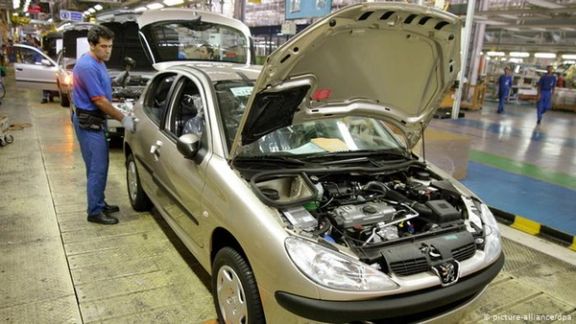
The head of construction workers trade union in Iran says the labor force is unwilling to work in large industries because of low wages amid a shortage of skilled workers.

The head of construction workers trade union in Iran says the labor force is unwilling to work in large industries because of low wages amid a shortage of skilled workers.
Akbar Showkat told ILNA news agency in Tehran on Saturday that neither the employers nor expert workers are satisfied with production and work at factories because of the government’s wage policies.
Because of highly erratic currency rates, businesses are reluctant to take risks as there is the ever-present danger of higher inflation.
“Most of the employers’ expenses are related to working capital, which leads to an increase in the price of manufactured goods every year and as a result it puts more pressure on the workers’ lives.”
Critics say the minimum wage increase for the new Iranian year violates the labor law by disregarding the inflation rate, which is more than 50 percent, while workers received half that amount for the new Iranian year which started on March 21.
Almost 15,000 workers have signed a petition, saying the 27 percent increase in the minimum wage and benefits to 82 million rials per month ($180) for a family of 3.3 is “unfair”.
The minimum wage in Iran is determined by a council composed of government, business, and government-approved unions, and in fact it sets the income for most wage earners.
Labor representatives insist that next year’s minimum wage in the non-governmental sector should be on par with the inflation of over 50 percent, but government representatives are of the idea that salaries should increase at about the same rate that public-sector employees are set to receive.
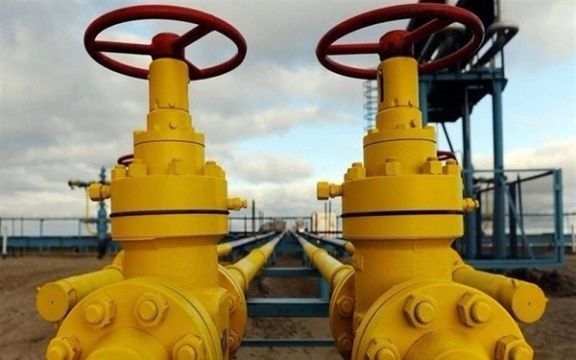
At least two people have been killed on Saturday in a gas explosion in southwest Iran, the Iranian IRGC-affiliated Fars News Agency reported.
Amir Abbas Najafi, Deputy of Khuzestan Province Red Crescent Relief and Rescue Department told Fars that “Unfortunately, two people were killed at Butan gas distribution company of Ahvaz after a 4,000-liter tank exploded.
"The fire is spreading to another tank, but firefighters are trying to put out the flames, and members of the Red Crescent are providing support at the scene of the incident," he added.
The cause of the accident is still unknown and under investigation.
Head of Ahvaz Fire Department, Ebrahim Qanbari told IRNA that the fire at the tanks should not be extinguished at once and gas should be allowed to burn out because there is a possibility of other explosions.
“The firefighters are on the scene trying to keep the tanks cool until the gas burns completely and does not spread to other parts.”
On March 14, two other people were killed in a gas pipeline explosion near Ahvaz city. "The pipeline links the gas network from Mahshahr city to Ahvaz," ISNA reported, adding that one child and a woman were killed in the blast.
Poor safety measures and Iran's aging infrastructure have been blamed by some authorities for similar accidents in the past.

Tit-for-tat attacks have continued between the US military and Iranian-backed forces in Syria, who threaten more strikes as US vows to protect its personnel.
There were no statements by Iranian officials by midday Saturday in Tehran, while Tasnim news agency affiliated to the Revolutionary Guard (IRGC) carried the news of events in Syria without carrying any comments by Iranian officials.
The US conducted at least one major air strike early Friday after a suicide drone attack killed a US contractor and injured several servicemen at a US base in northeastern Syria.
Apparently, the US carried out more retaliatory strikes later on Friday following a second attack by Iran-controlled militias. It is not clear if these were air attacks or missile strikes. The US Central Command issued a statement saying that Friday morning at approximately 8:05 local time, “ten rockets targeted coalition forces…”
Meanwhile, these forces said in an online statement late Friday that they have a "long arm" to respond to further US strikes on their positions, after tit-for-tat strikes in Syria over the last 24 hours.
The statement, signed by the Iranian Advisory Committee in Syria, said US strikes had left several fighters dead and wounded, without specifying their nationality.
"We have the capability to respond if our centers and forces in Syria are targeted," the statement said.
According to a war monitor, at least 16 people were killed in the first US retaliatory attack, mostly local or non-Iranian personnel, while the identity of four casualties remain unknown.
President Joe Biden on Friday warned Iran that the United States would "act forcefully" to protect Americans, after the US carried out air strikes against Iran-backed forces.
"Make no mistake: the United States does not ... seek conflict with Iran but be prepared for us to act forcefully to protect our people," Biden told reporters during a visit to Canada.
Earlier, US officials had emphasized that the retaliatory strike was a measured response to the attack on the US base, but the follow-up attacks by Iranian-supported forces posed the question if more serious retaliation is needed to deter Iran.
Republican Senator Lindsey Graham tweeted that “The Biden administration could learn something from the Trump Administration about deterrence…The targets the Iranians fear most are their refineries. For every attack against Americans in the future, take down an Iranian refinery and their oil and gas infrastructure.”
In fact, former President Donald Trump who ordered the killing of IRGC’s Qassem Soleimani in Baghdad in January 2020, had earlier refrained from retaliation against Iran when Saudi Arabia’s vital oil installations came under Iranian drone and missile attacks in September 2019.
Other critics argued that targeting Iran’s proxies is not a real deterrent, since the purpose of having these forces is exactly to offer “plausible deniability” by Tehran.
The main reason for Soleimani’s killing according to the Trump Administration was his efforts to organize more attacks on US troops in the region.
Congresswoman Joni Ernst tweeted, “Iranian proxies have attacked US servicemembers nearly 80 times. What has President Biden done about it? Cozied up to Iran in hopes of a fanciful and flawed “nuclear agreement,” & failed to hit Iran’s regime where it hurts, their wallets, by enforcing much-needed sanctions.”
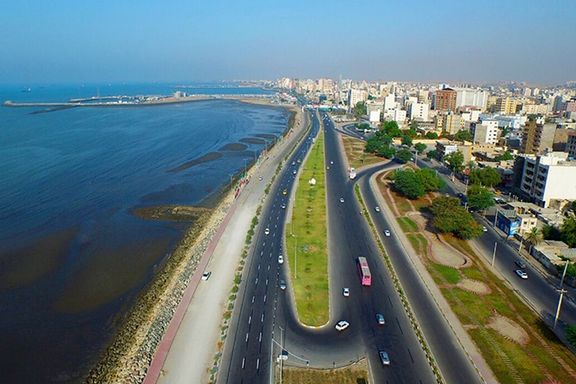
An Iranian official says China’s private sector has entered the port city of Bandar Abbas on the Persian Gulf to evaluate logistics and investment opportunities.
Iran's Secretary of the Shipping Association, Masoud Polmeh however noted that so far there have been no tangible actions leading to significant investment by the Chinese.
He added that “certainly, the Chinese government has not made any investment in Iranian key port city of Bandar Abbas.”
Polmeh also raised hope that the political agreement between Iran and Saudi Arabia could pave the way for signing economic agreements.
China officially opened its Consulate General in Bandar Abbas in December 2022. The opening of the consulate was described as an opportunity to practically implement a 25-year deal between Tehran and Beijing signed in 2021 and China’s ambitious Belt and Road Initiative (BRI), a global infrastructure development strategy to invest in nearly 150 countries.
The BRI, originally named, “One Belt, One Road,” is an international development strategy as China looks to expand its influence worldwide by improving trade routes. As of December 2021, China had expanded its’ BRI—which includes infrastructure developments across land corridors, in ports, across maritime routes, as well as over-land links (bridges, tunnels, etc.)— into 142 countries. Developing diplomatic relations with Iran is crucial to China’s ability to implement the BRI.
Bandar Abbas, the most important Iranian port is also home to a large Revolutionary Guard navy base.
Many Iranians criticize the government's policy of forging deeper relations with China while not resolving disputes with the United States and Europe over its controversial nuclear program.
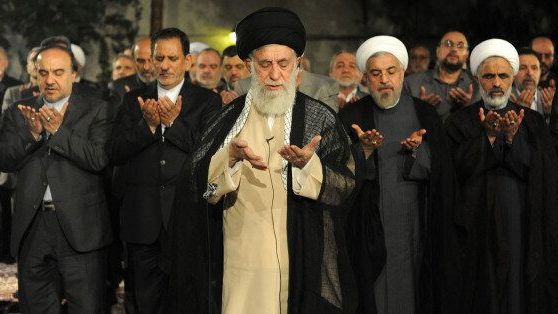
A relatively moderate politician says Iranians no longer believe in the reformist-conservative dichotomy that has been the mainstay of regime politics for 25 years.
Referring to mass disqualification of well-known reformist figures in previous elections, Ghavami told Entekhab news website in Tehran that the people are unlikely to vote for a few low-key reformists who are usually allowed to run for the parliament.
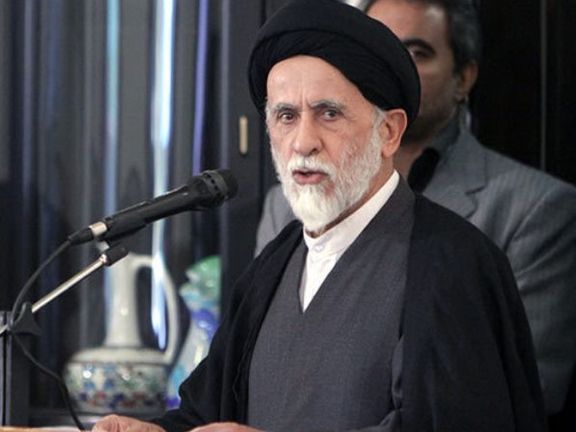
"However, as a lot of people will take part in the elections anyway, they are likely to cast blank ballots in the 2024 parliamentary election," he added in the March 24 interview. However, Ghavami pointed out that the country's biggest problem in the new Iranian year that started on March 21 will be the back-breaking high cost of living.
“Reformists are those politicians and public figures who have long argued that Iran needs change and reforms, but have believed that in its current form the Islamic regime can evolve and become a more democratic political system. Opposing them are ‘principlists’ or conservatives and hardliners who traditionally did not believe in liberalization.
In the 2020 parliamentary and 2021 presidential elections, the Guardian Council that vets candidates according to the constitution blocked almost all reformists from putting forth their candidacy. As a result, all three government branches are now dominated by hardliners loyal to Iran’s authoritarian ruler Ali Khamenei.
Ghavami pointed out the "non-competitive" nature of elections in Iran and said the regime will hold next year’s elections anyway regardless of the people's reluctance to turn out to vote.
In another comment, Ghavami said that Iran needs reforms in the area of foreign policy, but the current administration of President Ebrahim Raisi is incapable of changing course. Probably out of political correctness, he did not mention that foreign policy is controlled by Khamenei.
Rising prices, Ghavami said, are likely to cause a political, economic and social catastrophe in the coming months. Positive change in Iran is unlikely as long as the government cannot solve its domestic and international problems and fails to respond to the demands Iranians have put forward during their protest.
Meanwhile, in an interview, academic Mohammad Javad Gholamreza Kashi said most of Iran's problems are due to the fact that hardliners in the government and parliament have refused to recognize the idea of people's participation in politics.
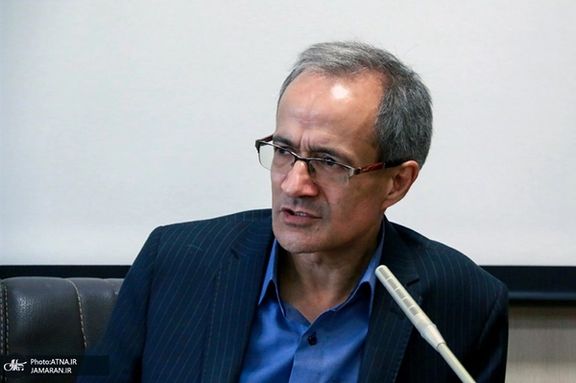
He likened Iran's current situation to a case of childbirth during which the hardliners are determined to kill the baby before it is born. This comes while the society is looking for a natural birth, he said.
Kashi, an assistant professor of law and political science reiterated that while the people of Iran have pluralist demands, the hardliners continue beating on the drums of unilateralism. Explaining this in sociological terms, Kashi said that hardliners are adamant to solve a modern problem with an old and outdated solution.
He traced back Iranians demands to the 1905 Constitutional Revolution that although led to modernism in the form of new buildings, roads, railways and airports after less than half a century, its demands for the rule of law, freedom and justice were never met.
In the meantime, while the people have embraced modernism, Iran's new rulers are the same religious fundamentalist they used to be at the beginning the 20th century. "The baby is still not born," Kashi said, adding that "the people are running out of patience and demand a Cesarean surgery while the hardliners are likely to pull a new trick out of their sleeves."
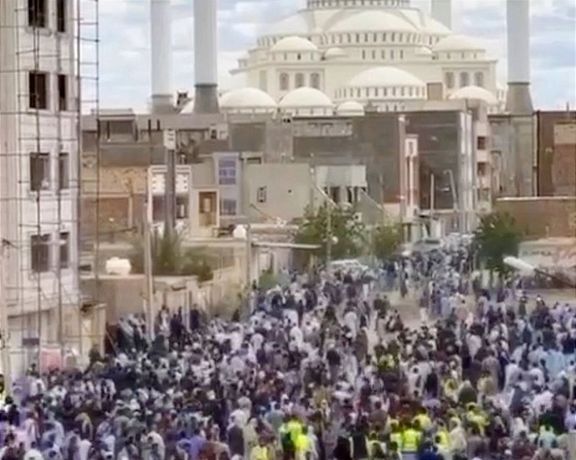
Protests erupted again in Iran’s Sunni majority region Friday as community’s prominent religious leader slammed Islamic Republic for its violence and lack of real elections.
During his Friday prayer sermons, which was the first in the fasting month of Ramadan, Mowlavi Abdolhamid said, "In the past, we have had elections in which we elected representatives and presidents, but they were not real elections, they were appointments.”
In a free election, people have a choice to vote for whoever they deem fit to represent them, but in Iran the Guardian Council puts forth a number of their cherrypicked insiders, who are not capable of running the country, he said.
He further described killing of protesters and harsh treatment of people detained during over six months of nationwide rallies against the regime as a "big mistake" and a "grave sin."
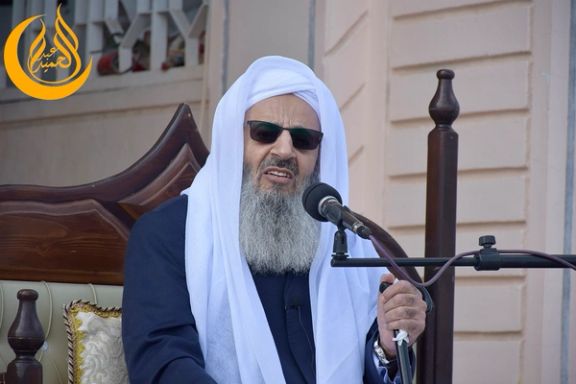
"There are protests everywhere in the world, but they (authorities) listen to the people and do not kill them like they did in Iran. Killing protesting people in Iran was a big mistake. They should not have hit and killed people with gunfire. Many people went to prison and the detainees were treated harshly, which was a painful and regretful incident,” he said.
Abdolhamid went on to say that neither religion, nor sect, should be a factor when it comes to elections, noting that the only people who should be in managerial positions are those who can make Iran prosperous, not like the current officials who only care about filling their own pockets.
Although street protests are not as frequent as the past few months, peoples’ hearts are "wounded and in pain," the cleric maintained.
Portraying the previous Iranian year as a grim year with lots of ups and downs that led to the creation of the current protest movement, he said, “The people of Iran felt difficulties regarding many issues, they saw themselves in trouble and failure in life, they were under the most severe economic pressures that threaten their livelihood."
In addition to economic issues, the outspoken Sunni leader said systematic corruption, as well as unpopular domestic and foreign policies were other factors led the people to revolt.
This Friday again authorities shut down internet access in Zahedan, the provincial capital of Sistan-Baluchestan where Abdolhamid delivers his sermons and it is home to the country’s Sunni Baluch minority of up to two million people. Cyberspace watchdog NetBlocks confirmed the major disruption to internet service, saying that the incident follows an ongoing pattern of network blackouts targeting protests during Friday prayers.
Following his sermons, people of the city held rallies to protest against the Islamic Republic for the 25th week in a row, chanting anti-regime slogans like “We Don’t Want a Child-Killing Regime.” The Sunni Baluch population have taken to the streets in Zahedan every Friday after prayers since September 30 when government forces cracked down on protesters and killed more than 80 protesters, known as Bloody Friday. Earlier in the day, Haalvsh website, a local news outlet that monitors rights violations in Iran's Baluchestan region, said 121 of the protesters who were killed in Zahedan and Khash on Bloody Friday were identified.